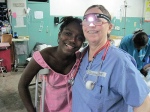
Nurses often take their skills beyond the bedside. They travel the world showing compassion for the world’s sick and suffering, spreading a single-standard of care for all people, and ensuring a just distribution of life’s basic necessities. However, saving the world can mean starting with the questions, “where do I go?” and “what can I do that will actually make a difference?”
Nurses can answer those questions in classes offered through the Institute for Women’s Leadership at Rutgers University. The Global Women’s Health Leadership certificate program was developed with National Nurses United, and enrollment is open for classes in the fall of 2013.
The instruction is all on-line, and no attendance at Rutgers is necessary. Future classes will include:
Impacts of Economic Inequality on Women’s Health
Domestic and global economic inequality place significant numbers of people at high risk for health crises even as they are denied access to care. This course investigates the “pathogenic” aspects of economic inequality. It examines how systems of unequal resource distribution contribute to wide disparities of health risk, access to healthcare, and clinical outcomes.
Debt, Crisis, and Women’s Health
Growing national debt has become a feature of increasing numbers of nations over the past 60 years, heightening dependence on international financial institutions and restricting the sphere of freedom of national policy makers. Healthcare provision has been subjected to severe cuts as nations struggle to meet their debt obligations and stabilize their economies.
Gendered Health Impacts of Structural Adjustment Programs
Since the 1980s, the World Bank and the International Monetary Fund have conditioned loans to poor countries on implementation of economic policy requirements known collectively as structural adjustment. This course considers the gendered health effects of structural adjustment. It investigates why women are over-represented among those most negatively affected by cuts in public services, how their caretaking burdens increase and their paid employment decreases disproportionately with privatization.
Health Consequences of Global Trade in Food Commodities
Close to one billion people suffer from malnutrition and many more from food deprivation in the twenty-first century. This course investigates shifting modes of food production as local practices of subsistence agriculture have been replaced by export agriculture and global commodities markets. The course compares the consequences of these changes for women as consumers in the global North as well as for women as producers of subsistence in the global South. Examining impacts of global commodities markets on food distribution, diet, and health, the course also analyzes the health effects of the creation of consumer markets for processed foods.
Health Consequences of Global Trade in Pharmaceuticals
Multinational pharmaceutical companies remain the primary developers of new drug regimens. The health effects of drug research and development, however, vary markedly from one region of the world to another. This course explores the political economy of the global pharmaceutical industry, analyzing the distribution of burdens and benefits. It examines ethical issues, such as clinical trials on populations in the Global South; continuing sales of drugs across the Global South after they have been banned in the global North.
Gendered Professions and the Transnational Care Economy
Nursing lies at the heart of the “care economy.” Involving work that requires intensive physical labor, person-to-person communication, and spatial proximity, the intimate nature of care work resists mechanization. In contrast to the production of commodities, the highly personalized labor of care is driven by human need rather than profit maximization.
Tuition for courses is currently $2,304. NNU is in the process of negotiating tuition rates with Rutgers. NNU’s disaster and community relief program, the RN Response Network (RNRN) will offer a limited number of scholarships each term to RNRN members who are interested in taking courses. The scholarship will provide the opportunity for RNRN members to enhance their fundamental understanding of global health conditions, as well as the connection between disaster relief, the core mission of RNRN, and the global conditions that contribute to the ability or inability of health systems to properly respond when disasters occur.
Nurses must be RNRN members to qualify for scholarship opportunities. To apply for a scholarship or for information on how to join the RN Response Network, contact Alice Grubb.
Current and upcoming courses will be continually updated on this website. If you are interested in taking a course offered during the fall semester, please contact Janelle Fine before August 15th, 2013, and if you are interested in taking a course offered during the spring semester, please contact Janelle before December 15th, 2013. Please check back for a schedule of current and future course offerings.
